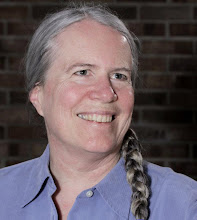I had a useful meeting with an Elder Law attorney yesterday, so let me sum up what I know.
If you don't want to spend all your savings on your spouse's care, it is worth seeing an elder law attorney who specializes in Medicaid at least 5 years before your spouse needs nursing home care, particularly if your spouse does not have long term care insurance (or might run out). The rules are very complex and vary a lot from state to state.
Medicare does not pay for nursing homes beyond a few months of rehab. Medicaid will help with the cost of a nursing home, but only after most of the savings of both spouses have been spent, which is easy to do when a nursing home costs $5,000 to $10,000 a month and some people with dementia live in a nursing home for many years. My husband's 100 year old aunt has been in a nursing home for two years and is doing well--in a wheelchair but still mostly competent and enjoying going out to a restaurant for lunch. Her long term care insurance lasts 4 years, of which she has used close to two. When that gets close to running out she will have to move to a nursing home that takes Medicaid, but spending down her savings and applying for Medicaid should be fairly straightforward.
It isn't so straightforward if you are married. Medicare treats the two spouses as a unit--it doesn't matter if assets are in one name only (even a prenuptial agreement won't allow one spouse to keep separate funds). The well spouse is allowed to keep the house and its contents, one car, and half of the couples savings up to around $100,000. All the rest of the couples's savings must be spent on nursing home costs, including in many states the well spouse's retirement savings. I have a lot more than $100,000 in my IRA and 403b retirement savings accounts. If I didn't live in South Carolina, I would have to pay the early withdrawal penalty (I'm only 56 so I could easily be under retirement age when I needed the money) and spend down those funds on my husband's care before we could get Medicaid help with the cost of a nursing home.
What about my retirement years after he is gone or money I had hoped to pass on to my children? About the only way to keep more than the allowed amount for myself is divorce. I do have some options for my children if I do it now. Medicaid looks back and counts any money given away up to 5 years before the person applies for Medicaid. I can give money to my children or set up an irrevocable trust for them, because I am at least 5 years away from needing help, but if I did that within 5 years, Medicaid would not pay for a number of months equivalent to what was given away.
Be careful also if you expect to inherit any money. If my mother dies before my husband, the inheritance I get from her must be spent on his care before he would be eligible for Medicaid. There may be a way to fill out legal forms to refuse the inheritance now, so it goes to my kids instead. But I have to do that before the five year look-back or Medicaid would count it as a gift.
Friday, September 23, 2011
Thursday, September 15, 2011
Reflections for my 35th Reunion
Here's what I wrote for my 35th college reunion (which I don't plan to go to):
My kids are in college—it isn’t yet clear what their life choices will be. I’m still in the same job (over 25 years now). I built a program, Science and Technology in Society, that is holding fairly steady, but at a state university in this economy, holding steady is the best I can hope for. I spent 7 happy years doing triathlons, my longest one a half-ironman, but I’m not finding room in my life for the training any more.
The big change in my life is that my husband (now 66 years old) was diagnosed with Parkinson’s disease and the beginnings of dementia in 2008. His disease is progressing slowly and he can still mostly take care of himself, but I take care of almost everything else. It is far from the equal partnership marriage I signed on for. I managed renovating a house for his future needs and we moved--that was my major focus for a year and a half. The past year and a half has focused on my daughter’s college search process. I still enjoy my job, but I haven’t figured out how to focus on my own research the way I had hoped to when I reached empty nest.
I haven’t made peace with the lack of control yet. I understand that there is nothing we can do to stop my husband’s slow decline, but it is hard to wrap my mind around that and stop researching the disease. On a day-to-day basis the difficulty is how often I have to drop what I might have planned to do and instead help my husband with something or take him to a doctor’s appointment or do something for his 100 year old aunt, who lives in our town. And this could easily go on another 10 years. It is the task I have been given and I’m good at some of it. But I mourn my hopes for in this stage of life.
Subscribe to:
Comments (Atom)

